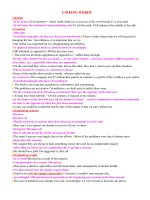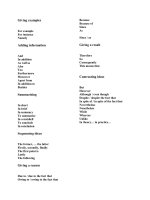Common linking words
Bạn đang xem bản rút gọn của tài liệu. Xem và tải ngay bản đầy đủ của tài liệu tại đây (9.23 KB, 2 trang )
Common linking words
Here is an overview of common linking words in English.
To give examples
To give examples we can use the following linking expressions:
for instance, for example, in particular
People often behave stupidly when they are frightened. Take Alice,
for instance
, …
We are not at all happy with the way you handled the situation
. In particular
, we ….
To show contrast
To show contrast you can use the following conjunctions and conjunctive adverbs:
but, however, otherwise, in
contrast, on the other hand.
Their front door was open
but
nobody was inside.
Their front door was open;
however,
nobody was inside.
The technology sector is performing badly. The banking stocks,
in / by contrast
, are doing well again.
Sam was quite rude. His brother,
on the other hand
, behaved very politely.
To show concession
The following conjunctions and conjunctive adverbs can be used to show concession:
however, yet,
nevertheless, although, despite, even though, despite the fact that
etc.
The car broke down on the way.
Nevertheless / however
, I managed to get to the meeting in time.
Even though
he has a master’s degree in English, he still can’t write a good letter.
To show similarity
To show similarity, you can use the following conjunctive adverbs:
likewise, similarly, in the same way
My mother did everything she could to educate us.
In the same way,
we put a high value on our children’s
education.
To show result
Use the following expressions to show result:
therefore, as a result, thus, consequently, so, as a
consequence
They have recruited more people and
consequently
the service is better.
The new laptops are thin and light and
therefore
you can carry them around more comfortably.
To indicate time or sequence
A large number of expressions are used to indicate sequence. Examples are:
first, firstly, second, secondly,
finally, lastly, immediately, formerly, thereafter, soon, next
etc.
Be first to know when grammar rules change! Sign up to our newsletter here: englishgrammar.org (It's free)
Powered by TCPDF (www.tcpdf.org)









